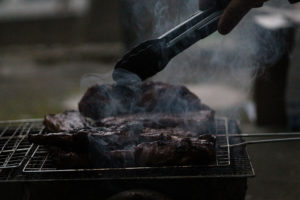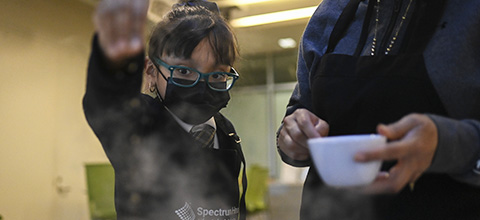
When you fire up the grill for your cookout, beware: Those tantalizing aromas hold an underestimated health risk.
Grilling meats at a high temperature can produce cancer-causing compounds called polycyclic aromatic hydrocarbons (PAHs). You can be exposed to significant PAH levels simply by breathing in the sweet scent of barbecue.
A new study from China suggests letting your skin come into contact with PAHs when you grill food is even more harmful than just savoring the aroma. And clothing won’t fully protect you against them.
Our Take
Additional Grill Safety Tips
- Practice precautions when firing up the grill, making sure you’re not near the side of the home or garage, or by highly flammable materials such as pine needles.
- Don’t cross contaminate. Use one platter and tongs for raw meat and another clean one for cooked meat.
- Always use a food thermometer. One out of every four hamburgers turns brown before it’s been cooked to the safe internal temperature of 160 degrees. The only way to be sure meat is cooked to a high enough temperature to kill bacteria is to use a food thermometer. Use this USDA food temperature chart as a guide.
- Always turn off the gas nozzle at the tank when you’re done with grilling.
PAHs can cause lung disease and DNA mutations, the researchers said. Though eating barbecued meats is the most common source of exposure, just standing near a grill and breathing PAH-contaminated air can be risky, previous studies have shown.
For the latest study, published in Environmental Science & Technology, a team led by Eddy Y. Zeng at Jinan University closely examined skin exposure to PAHs from barbecue fumes and particles.
The researchers divided volunteers into groups based on various levels of exposure to grilled foods and smoke.
Urine samples revealed the greatest PAH exposure came from eating grilled foods, but skin contact was in second place, followed by inhalation of barbecue fumes.
Clothes can help protect you from the smoke, but only for a short period, the researchers noted in a journal news release. Once fabrics become saturated with contaminated smoke, the skin can absorb high PAH levels.
To reduce your exposure to these toxic compounds, the researchers recommend laundering clothes immediately after you are around a grill.
 /a>
/a>
 /a>
/a>
 /a>
/a>